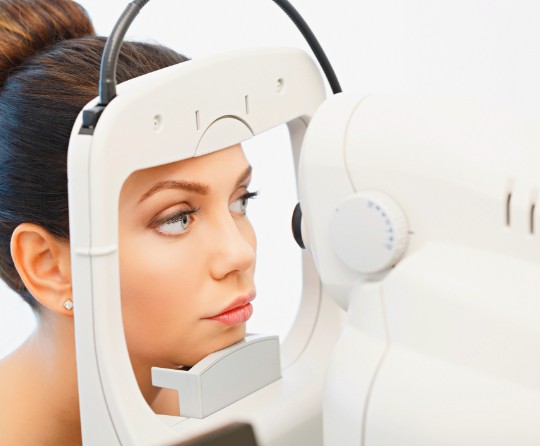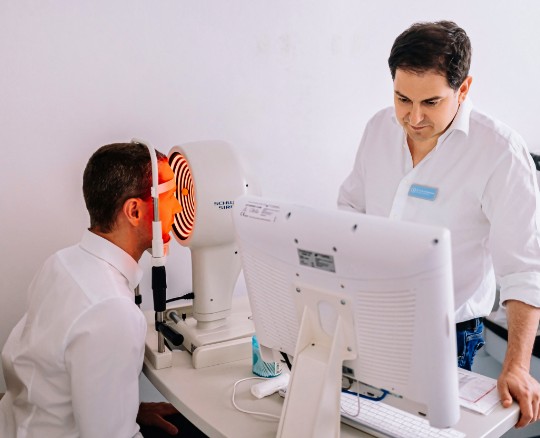Free yourself from glasses and contact lenses with ultra-precise Swiss-optmised laser eye surgery
- Our specialised, high-precision vision correction services allow you to see brilliantly without glasses or contact lenses




Imagine waking up in the morning and seeing the world through clear eyes, taking part in any physical activity without restriction or going on vacation without any worries.
Millions of people all over the world have already experienced the freedom that laser eye surgery provides. It’s the most popular voluntary surgery in the world.
Dr. Victor Derhartunian, EyeLaser’s senior eye surgeon, learned his craft from Theo Seiler. He is the pioneer of the world’s first laser eye surgery performed in 1987.
Since then, this scientifically recognized procedure has been developed and perfected further. Many long-term studies confirm the high success rate and rapid healing of the treatment. The medical procedure has even been approved for jet pilots and astronauts.
There are many types of laser eye treatments. However, they all have one thing in common: they shape the cornea of the eye with high-precision lasers so that you can see flawlessly.
Laser eye surgery at EyeLaser is safe, quick and painless. The treatment only takes 15 to 20 minutes, and you will be able to see clearly within a few hours or days.
We will not treat you according to a formula. We will spend a lot of time with you to tailor treatment specifically to your unique circumstances. We will thoroughly examine and test your eyes so we can determine the perfect treatment method for you.
LASIK is the best known and most commonly performed laser eye surgery.
After this treatment, you’ll have made the smart choice to live life on your own terms and will no longer need outmoded glasses or contact lenses to see. You can live life with the exceptional natural vision you deserve – without compromise.
PRK is a great solution if you want to be free from glasses and contacts but are unsuitable for LASIK. Once we’ve enhanced your vision, everyday activities become optimised with Swiss precision. Whether you’re making a cup of coffee, applying makeup or working out, you’ll be amazed at what you can achieve without glasses and contacts.
SmartSight is the latest and most minimally invasive form of laser eye surgery. After this treatment, you’ll feel confident and ready for whatever life brings without the anxiety around your glasses and contact lenses getting in your way.
ICLs free you from glasses and contacts if you’re unsuitable for laser eye surgery. Even if you have already been told that laser treatment is not possible for you, or you would like to have a reversible procedure to correct your refractive error, a spectacle-free life is possible with ICL surgery.


Together we will assess your needs and discuss possible treatments. During the first free consultation, you will get to know our practice and can clarify any questions you may have about laser treatments. We are also happy to conduct the consultation online as a video conference.
Book an assessmentLaser eye surgery in Zurich with leading Lasik surgeons: Gain visual freedom with our method for exceptional laser eye surgery.
Discover everything you need to know about laser eye surgery
Are you suitable for laser eye surgery?
First things first: we can treat 99% of the patients who contact us. However, if you are not suitable for a surgical procedure, we will tell you this and unfortunately have to turn you away as a patient. This is a matter of course for us as serious eye surgeons. Of course, we will do everything in our power to help you achieve better vision. At EyeLaser, the decision is in the hands of specialists.
No two eyes are the same. Our primary concern is therefore to determine your visual acuity or defective vision as accurately as possible. To this end, we use only the most modern technologies and highly qualified personnel for the initial preliminary examination.
There are different methods for the surgical correction of visual defects. Not everyone is suitable for classic laser eye treatment. However, there are alternatives such as lens implantation, which can also be considered for more pronounced refractive errors or corneas that are too thin or irregular.
Are you suitable for laser eye surgery?
First things first: we can treat 99% of the patients who contact us. However, if you are not suitable for a surgical procedure, we will tell you this and unfortunately have to turn you away as a patient. This is a matter of course for us as serious eye surgeons. Of course, we will do everything in our power to help you achieve better vision. At EyeLaser, the decision is in the hands of specialists.
No two eyes are the same. Our primary concern is therefore to determine your visual acuity or defective vision as accurately as possible. To this end, we use only the most modern technologies and highly qualified personnel for the initial preliminary examination.
There are different methods for the surgical correction of visual defects. Not everyone is suitable for classic laser eye treatment. However, there are alternatives such as lens implantation, which can also be considered for more pronounced refractive errors or corneas that are too thin or irregular.
Basically, you should fulfil the following criteria for an eye operation:
– You are of age, i.e. at least 18 years old.
– Your visual acuity has been stable for at least one year.
– Your eye is healthy – you do not suffer from any relevant eye diseases.
– You are in a generally good state of health.
If you meet these criteria, you are generally eligible for laser eye surgery and we can determine which treatment method is best for you in a consultation and preliminary examination. The following methods are recommended depending on your specific visual defect:
Laser eye surgery for short-sightedness
| up to approx. -10 dioptres |
Femto-LASIK/LASIK/SmartSight |
|---|---|
| up to approx. -6 dioptres |
Femto-LASIK/LASIK/LASEK/SmartSight |
| approx. -6 to -25 dioptres |
Phakic Lenses (ICLs) / lens exchange |
Laser eye surgery for farsightedness
| up to max. +4 dioptres | Femto-LASIK / LASIK / Phakic Lenses (ICLs) / lens exchange |
|---|---|
| approx. +5 to +10 dioptres | Phakic Lenses (ICLs) / lens exchange |
Laser eye surgery for astigmatism
| up to 5 dioptres | Femto-LASIK/LASIK/LASEK/Phakic Lenses (ICLs) / lens exchange/SmartSight |
|---|
Laser eye surgery for presbyopia
| Without other refractive errors | PresbyMax/Femto-LASIK/Monovision/lens exchange |
|---|---|
| Hyperopia/Myopia +3 to -5 dpt | PresbyMax/Femto-LASIK/Monovision/Presbyopia-LASIK |
| All visual defects | Lens exchange with monofocal/multifocal implants from Physiol, Zeiss, Precizon Presbyopic, Hoya or Panoptix (Alcon) |
On the respective sub-pages you can find detailed information about the visual defects and the appropriate methods for their correction. We will also be happy to advise you personally. Simply arrange a free initial consultation.
Risks and side effects of laser eye surgery
As with any operation, eye surgery involves certain risks and side effects. The attending surgeon will explain these to you in detail at your consultation.
Although the complication rate with laser eye surgery is well below 1%, different paresthesia can occur. This depends on the vision correction method chosen. With most laser eye methods, any discomfort disappears after a few hours. You will have good eyesight the next day.
Laser eye surgery has been a scientifically recognized procedure for decades. It is one of the most frequently performed operations worldwide. The risks are extremely low. We reduce those risks even further through:
Nevertheless, we would like to inform you about possible complications:
During your preliminary examination, we will discuss these risks and side effects with you. Ultimately, you should only opt for an eye laser operation if you feel confident in the treating surgeon.
Together we will assess your needs and discuss possible treatments. During the first free consultation, you will get to know our practice and can clarify any questions you may have about laser treatments. We are also happy to conduct the consultation online as a video conference.
In this personal consultation with the specialist, possible options for eye surgery will be explained to you and all relevant data will be recorded:
Ahead of the preliminary examination for laser eye surgery :
After the preliminary investigation, we will inform you if you qualify for laser or lens surgery. We will also tell you about the course of the operation, the risks and side effects and the aftercare. Of course, we are happy to answer all your questions along the way.
You can then either make an appointment for your surgery on-site or – after sufficient time to think it over – by telephone. We try to allocate the appointments so that they fit into your schedule. The waiting time between the preliminary examination and the operation is one day to a few weeks – whatever works for you. After the initial examination, it is possible to wear contact lenses again.
Ahead of your treatment
On the day of the operation, you will come to our practice with an accompanying person. Please do not use face cream, aftershave or make-up etc., on your face on this day. We will use eye drops to anaesthetize your eye locally. This means you can eat and drink normally.
If you have any final questions, your surgeon can clarify these and perform any further investigations if you have any doubt.
We will give you medication and instructions to use after the operation. We will also make an appointment with you for the follow-up examination the following morning.
The operation itself only takes 10 to 20 minutes. You will then receive protective goggles, and your companion will take you home.
What you should consider after the laser eye surgery
We recommend planning a downtime of one to several days. Your eyes are very sensitive, and most patients report:
The day after the successful operation, you will come to our practice for your first follow-up examination. Normally, you will have little to no discomfort on this day and your vision will be around 90%. If your healing is going well and the post-operative checks are satisfactory, the next examination will be arranged for a month later.
After a few weeks, optimal vision is achieved. The results may fluctuate minimally during this time depending on the day – please give your eyes some time.
We recommend an annual follow-up examination (CHF 180/year). This is to detect any changes at an early stage. If you take advantage of the annual check-ups, you will also benefit from our lifetime guarantee.* In the event of a deviation, we will correct your visual acuity free of charge.
After the laser eye surgery: Enjoy your new life without glasses or contact lenses!
*The lifetime guarantee includes a free follow-up correction if the target correction deviates due to measurement deviations, laser beam variations and wound healing, and correction is medically reasonable and feasible according to international recommendations. Excluded from this are deviations due to changes in the eye as a result of eye diseases (such as lens ageing/clouding, glaucoma or AMD) and progression of presbyopia.
Discover our laser eye surgeons in the heart of Zurich

Things like age, eye shape, history and lifestyle make an eye treatment perfect for one person, but not another. Find out which treatment (if any) could free you from glasses and contacts
Take a quiz